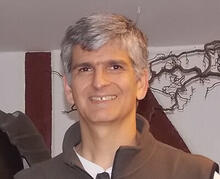Superfluidity and superconductivity are ubiquitous in interacting many particle ensembles at sufficiently low temperatures. The phenomenon exists in a variety of systems including metal, neutron stars, nuclei and ultracold atoms. Early theories proposed opposing viewpoints: Bardeen, Cooper, and Schrieffer (BCS) offered a weak coupling perspective with large overlapping fermion pairs, and Schafroth, Butler and Blatt proposed a strong coupling view of tightly bound fermions pairs that would undergo Bose-Einstein condensation (BEC), where the residual interactions between bosons stabilized the superfluid or superconducting state. These two views were later unified and a crossover from BCS to BEC for s-wave pairing at zero temperature was established. Furthermore, understanding of the evolution from BCS to BEC was extended to finite temperatures. While the evolution from BCS to BEC is just a crossover for s-wave pairing, for higher angular momentum pairing (p-wave, d-wave), quantum phase transitions are expected to occur when interactions, chemical potentials or densities change. In the context of ultracold fermions, I will describe the existence of crossovers and quantum phase transitions in s-wave, p-wave and spin-orbit coupled systems. I will highlight experimental results, theoretical predictions, and general difficulties for fermions with two internal states. I will end my presentation by suggesting that the exploration of ultracold fermions with three internal states may be the next research frontier, because box trapping potentials can produce uniform density systems and can potentially remove some of the existing barriers to the creation of more exotic phases of matter like color superfluidity without quarks.
Host: Nir Navon (nir.navon@yale.edu)
AMO Seminar: Carlos A.R. Sa de Melo, Georgia Institute of Technology, “The evolution from BCS to BEC superfluidity in metals, neutron stars, nuclei, and ultra-cold atoms: Is color superfluidity next?”
Event time:
Wednesday, May 10, 2023 - 2:00pm to 3:00pm
Location:
Sloane Physics Laboratory (SPL), Room 48
217 Prospect Street
New Haven, CT
06511
Event description:
Contact:
(see "Description" above)
